A Chicago Story
Volume 3 Book 8 Part 4 of
Living in the Bonus Round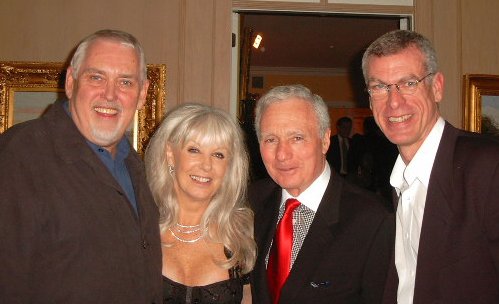
Jim Brochu, Sue Carey, Tom Carey, Steve Schalchlin.
A Chicago Story
Volume 3 Book 8 Part 4 of
Living in the Bonus Round
Jim Brochu, Sue Carey, Tom Carey, Steve Schalchlin.
March 16-17, 2004.[ Book 3-7 ] -- [ Pt 1 ] [ Pt 2 ] [ Pt 3 ] [ Pt 4 ] [ Pt 5 ]
[ Pt 6 ] [ Pt 7 ] [ Pt 8 ] [ Pt 9 ] [ Pt 10 ]
A Force Named Sue.Tuesday night was a very special night for Jimmy and me. We were the guests of honor at a special party/reception thrown by a prominent "socialite" here in Chicago named Sue Carey. I've mentioned Sue already in the diary but nothing I heard about her prepared me for the Force of Nature that is Sue Carey.Jimmy met her on the last cruise. They bonded and the next thing you know, she's deciding that since our production here in Chicago is so modest she would take it upon herself to make sure everyone "who is anyone" knows who we are and that they need to be at our show.
Now how sweet is that. So, a week ago she sends out invitations to a party. 700 engraved invitations. And Tuesday night, 100 people have RSVP'd. In her house is an 11-foot Steinway (which made Steve have multiple orgasms) and she's hired a full sound system. Here's a composite photo of her "music room" where the night's entertainment would take place:
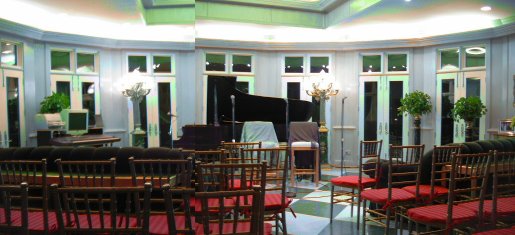
This is bigger than some theatres we've played in.Walking around the room, Jimmy found and took photos of Sue with Margaret Thatcher and the Pope.
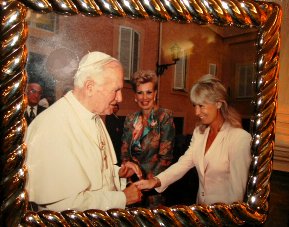

Where dinner was served.After a wonderful dinner, everyone packed into the music room for the evening's entertainment. One of the most charming things about Sue is her utter lack of pretense or pomposity. As an old show biz veteran who is both a self-made business woman (who married a successful businessman, Tom Carey, who owns Hawthorne Racetrack), and show biz veteran, she began her remarks talking about how she's obsessive compulsive and channels all the energy into positive life-affirming projects. For instance, she established a foundation that cares for abused and homeless teenagers. In recent years she learned to sing and to play and piano AND she's written an amazingly good musical called "Africa Plumbridge" about her experience in meeting her now adopted daughter, Africa.
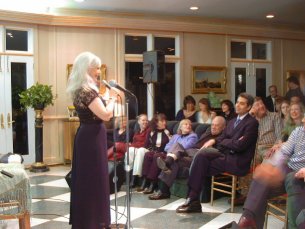
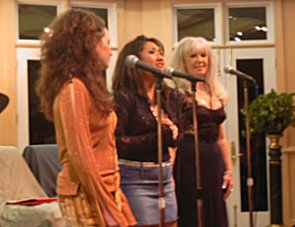
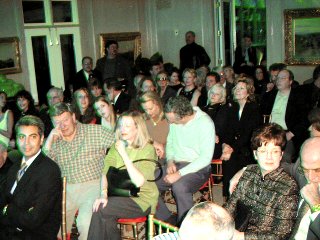
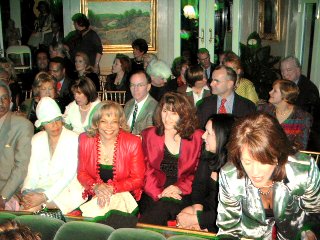
The audience in the music room.
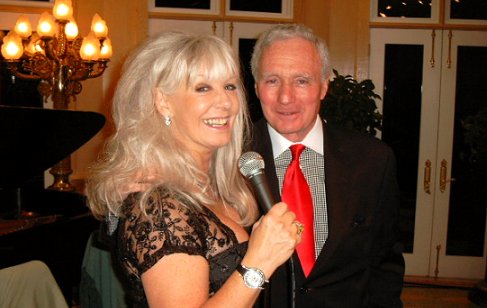
Sue & Tom Carey.
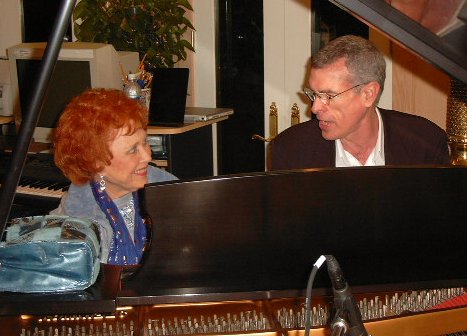
Inez with Steve. Inez is Sue's vocal coach.
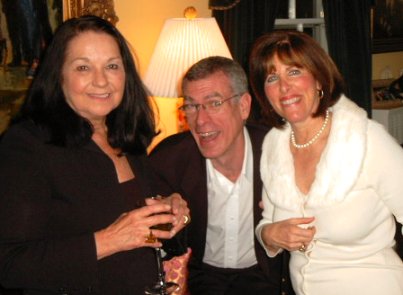
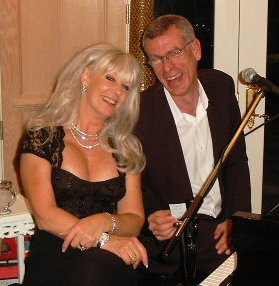
Jimmy and I got up and performed a bit of Big Voice. Then we told the people how important it was for them to talk about us and help us sell tickets. They seemed to really enjoy what we did. Well, we'll see. This weekend will tell us a lot.Wednesday morning we woke up and the snow was falling is huge, beautiful flakes giving us a beautiful wonderland outside our window.

Snowing in Chicago outside out window.Then we raced over to the grocery store to get the newspapers. But alas, the major dailies hadn't posted their reviews yet. Another day of nail-biting. However, we did get two good ones from some other publications. First of all, the gay newspaper, the Windy City Times. (It has been edited for brevity and to not violate copyright laws. We have not edited out any criticisms.March 18, 2004.WINDY CITY TIMES (Chicago) - March 17, 2004
If Ethel Merman’s voice was heard at the start of The Big Voice singing “Curtain up, light the lights,” the audience might have been disappointed because no curtain comes up here and the lights that are lit are very simple....The two creator/performers arrive on stage in pants and casual shirts. The set consists of a table, two chairs and an electric piano. I thought I was about to see a tryout or a staged reading but I was wrong - yes, critics can be wrong.Then, online from Talkin' Broadway:This autobiographical story, tweaked with high camp, big laughs, astonishing original music that ranges from heart rending ballads to slick musical theatre to gospel-infused to rock, shattered my expectations and won me over with first a chuckle then a guffaw then tears as Steve and Jim take us on the journey of their lives.
With warmth, poignancy, a great deal of charm and a lot of self-effacing humor, these committed, talented men bring their audience along on a stellar ride. Starting with a childhood fascination for theatre and music and being trapped in the confines of organized religion (one Roman Catholic and the other Southern Baptist), the pair chronicle their meeting as young men aboard a cruise ship, their domestic highs and lows, their familial relationships, their theatrical triumphs…and more importantly their personal triumphs - surviving AIDS and a serious break in the foundation of their relationship.
Brochu and Schalchlin are very talented men and The Big Voice succeeds despite its minimal trappings. This duo doesn’t need them. Their infectious humor and their ability to shine a spotlight on their personal and professional lives supersede any need for sets and props. The lack of these things make their characters and story sparkle even more brightly.
- Rick Reed
The Big Voice: God or Merman?So, it was a great couple of days. We had a wonderful party where we got to showcase the material for some "society folks." Plus, we got two really great reviews. Tomorrow, we're expecting notices from the Tribune and the Sun-Times -- and the city's alternative publication, the Reader.With the controversy of same-sex marriage occupying headline status over the past month, The Big Voice: God or Merman? couldn't be more perfectly timed. It's a highly entertaining exploration of the role of religion and spirituality in the lives of its two gay male writer/performers (Jim Brochu and Steve Schalchlin) and a window into their relationship as life partners for nearly 20 years...
Without resorting to caricature or impersonation, Brochu easily conjures the spirit of Merman. He tells of a chance meeting with her at a hospital where he's visiting a sick friend. Sharing his vocational confusion with her, he asks what he should do with his life. The divine voice answers, "How the hell should I know?"
Schalchlin tells of his similarly spiritual boyhood, in a heavily Southern Baptist-dominated Arkansas town of 500. His stories are less glamorous than Brochu's, but effectively told through his songs. He and Brochu eventually meet as adults on a cruise ship where Schalchlin is performing as a lounge singer-pianist. It's love at first sight, and they exit stage to close act one with "Everything's Coming Up Roses" over the sound system.
...
The two have an easy, self-deprecating humor in the fast-paced first act and a witty script that provides lots of genuine laughs. Their sincerity and candor keep the show engaging in spite of the fact that stories of gay adolescence and struggles to come out or stay closeted are not particularly new ground. When act two begins to address Steve's sickness, the tone appropriately shifts, but with some difficulty. Brochu and Schalchlin avoid cliches by focusing on the impact of the drug cocktail's side effects rather than spending too much time on Steve's physical condition. However, they could provide a more gradual transition from their self-effacing humor to the sharing of heavier emotions. It took me a while to become fully empathetic with their experiences after the first hour of laughing with them at themselves. Still, there's no denying that the emotional stakes of act two are significant. The age and gender-diverse audience at the performance I attended was genuinely moved.
The score of, by my count, eleven songs is accessible, diverse and contemporary in a Jason Robert Brown sort of way. Credited equally to both Schalchlin and Brochu (with "additional lyrics" by Marie Cain), it includes some lively comedy numbers as well as several beautiful and touching ballads, including "Beyond the Light," "Keep Me Near You," and "How Do I Fall Back in Love." Schalchlin is at the keyboard throughout and has a majority of the vocals while Brochu, the better actor, delivers more of the monologues.
The Big Voice is a moving and affirming piece that succeeds without becoming sentimental or maudlin. It tells how we can give or receive divine inspiration in the unlikeliest of ways and that we should not be surprised if the voice of God happens to shout "Sing Out, Louise!"
And, by the way, this is not the last of Sue Carey. Wait till next week. Another big surprise awaits!
Reviews.Yesterday, about midday, the Chicago Tribune went online and it's a rave. That's the good news. The bad news is that it never got into the print edition. ("Kicked aside for election coverage.")ARRRGGGGGHHHH!
So, I don't know how much it will help us in terms of ticket sales but in the long run, it will be helpful for our portfolio. Last night I was working with Neda Spears who will be playing Tryshia in the staged reading of TLS this next Wednesday. (She sounds fantastic, btw). When I told her about the review, she was thrilled for us. She said this particular reviewer has a reputation for "hating everything."
From the Chicago TribuneI think this is the first time anyone has praised my acting over Brochu's! Me? Complex and moving? Souful? BWAHAHAHAHAHA!
'The Big Voice' — the little musical that could
By Chris Jones
Tribune arts reporterGiven all the religious opposition to gay couples who consider themselves married, one can understand why Jim Brochu and Steve Schalchlin turned to the theater for spiritual sustenance. And by the end of "The Big Voice: God or Merman?" this performing duo has arrived at the public conclusion that the man upstairs actually was channeling his guidance via Ethel herself.
For these musical-loving gay men, it's not so much God or Merman as God through Merman. If that makes no sense, this show probably is not for you. And if it does? A wry and sweet little musical with off-Broadway ambitions awaits.
With a variety of original numbers, "The Big Voice" follows the familiar cabaret-style tack of using a life (or, in this case, two interwoven lives) as a trajectory for a show. Brochu and Schalchlin — best known for their contemporary musical "The Last Session" — recount both their own biographies and the tricky trail of their relationship from a first meeting through temporary divorce through reconciliation.
The theatrical strengths of the piece lie in its potent and provocative exploration of the two fellows' religious roots (Schalchlin was a Baptist in Arkansas; Brochu once was in a Catholic seminary in Brooklyn) and how they morphed into an acceptance of their sexuality. The two are a study in opposites — Brochu is loud, brash and cheery; Schalchlin is introspective and rather soulful. The first act feels trivial in the extreme — but once we learn about Schalchlin's survival of a near-death experience in the far stronger second act, the dramatic stakes quickly rise.
By the end of the night, the duo has fallen prey to a dangerous tendency toward self-aggrandizement. The thematic climax of the show comes when the pair face religious protesters in Dallas, but they make the mistake of adding a scene where the duo wins a variety of awards and Brochu gets his face on the wall at Sardi's. That's unnecessary vanity that needs to disappear before New York, even as the show adds more numbers.
Yet at its core, "The Big Voice" is an earnest, life-affirming show that's none the worse for its intensely personal roots. The performers — especially the complex and moving Schalchlin — are talented men with complex lives and poignant stories to share and sing about. One leaves the theater with a palpable sense of possibility.
I guess I can fool 'em when I want to, huh?
But I think he kind of contradicts himself in the review. First he says:
"The theatrical strengths of the piece lie in its potent and provocative exploration of the two fellows' religious roots..."...which is all in act one. But then he says:"The first act feels trivial in the extreme..."Well, which is it?? So the theatrical strength of the piece is in the part he says feels the most trivial? My suspicion is that he, like some reviewers, mistakes the high comedy of act one for triviality. We set up the piece in act one with Brochu's almost "baggy pants comedy" style but then we shift to a more dramatic tone in act two as we enter the darker phases of our relationship. So, it perhaps FEELS more serious. But, for me, comedy and drama are not opposites. He himself describes the the exploration of our religious roots (act one) as "potent and provocative."It doesn't really matter. The point is that The Big Voice is still batting .1000 in terms of reviews. We have yet to receive one single negative notice about the show. Not even TLS got reviews like this. Could it be that TBV is a better show? For some, it is. For others, they like TLS better.
Doesn't matter to me. We wrote 'em both. I kind of see them as a matched set. One of these days they will be done as I believe they should be done: in repertory.
© 1996-2004 by Steve Schalchlin. You have permission to print from this diary and distribute for use in support groups, schools, or to just give to a friend. You do not have permission to sell it.